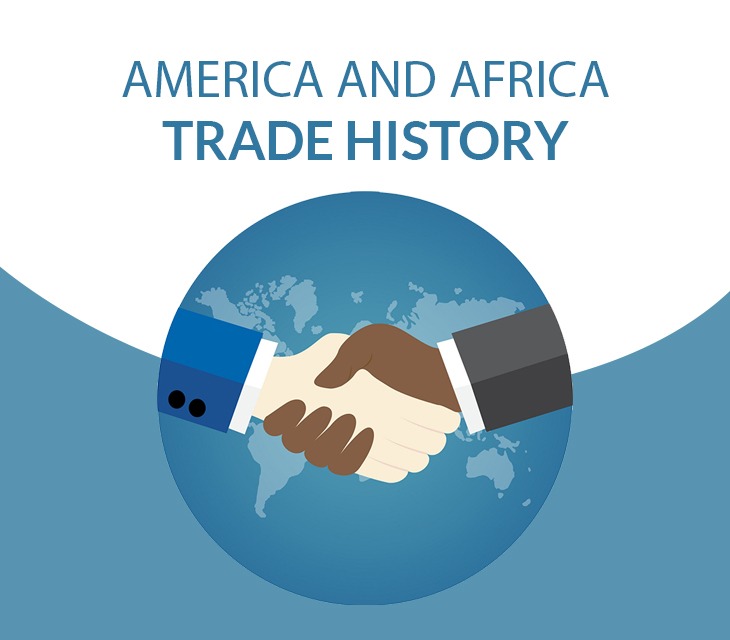
How to return the products
Jul 07 - 2021

America and African trade history
It’s no news that numerous African products are now
being used in America and vice versa. But have you ever wondered how Africans
and Americans began trading together? Let’s go down history lane and get
reminded of how it all started. Shall we?
Often, the African and American trade history is
dated to have started during the Atlantic slave trade. However, Africa had been
trading with Europe since as early as the third century. Europeans traveled to
Africa with things like clothes, beads, brass kettles, and guns to sell to
Africans in exchange for other products. The major product sold to Europe was
Gold and this kind of trade lasted till the late 14th or 15th century.
In the 16th century, European traders
started trading for ‘new products’. They started to buy slaves. This period is
known as the Atlantic slave trade or the Transatlantic slave trade. Europeans were colonizing the world and claiming
countries for themselves. They made money by taking advantage of the natural
resources in their territory. For example, The British-owned Caribbean Islands had
good land for growing crops like sugar, and the Europeans needed a dependable
workforce. As a result, they started to buy Africans from West African leaders
to help them with their farmwork. Enslaved Africans were also sold to Americans
for the same reason.
Most of the slaves were natives of Central and West
Africa. The slaves were sold in the Caribbean for molasses, converted into rum
in the American colonies and then traded back to Africa for more slaves in the
17th and 18th centuries. As time passed, people in the United Kingdom, America,
Portugal, and other areas of Europe rebelled against slave. It led to the end
of it in the 1830s.
We bet it’s a relief that
the slave trade ended, yeah?
Well, you would have
thought that Africans regained freedom and returned to their country, but that
was not the case. Many Africans had to make America and Europe their new home
as there was no way they could go back to their countries. Africans expressed themselves
so well in their skills and trade, with many Africans being well-versed in
large-scale rice and indigo cultivation. This, unfortunately, was foreign to
the European Americans. This started to influence industry and agriculture in
America.
For example, the rice
fields of South Carolina and Louisiana would not have existed if it hadn't been
for the skills of Africans and their descendants. Some modern American food
like okra, black-eyed peas, watermelon, and even kola nut, one of the major components
of coca-cola, were influenced by these Africans. Even though far from home,
most Africans found various ways such as food, language, music, groups, and so
on to express their culture. Many African Americans have begun to trace their
roots to Africa, and African products have been helping them find a connection
to their heritage.
With this, the need
for African products increased in American and European countries. Trade with
Africans has continued so that these needs can be met. Over the years, Africans
have also embraced American products, leading to a huge increase in demand and
import of these products.
Americans have grown
to love African products. And in like fashion, Africans have also embraced
American products putting history behind them. Travelling between countries or
native markets of these races posed many severe challenges leading to the advent
of e-commerce companies like Arfa International [INSERT Arfa International WEB URL]. With platforms like
Arfa, sales, operational costs, and access to African or American products are
a lot easier and less tense between both races.
Over the years,
Africans expanded their business territories. They started trading with other
nations of the world, leading to huge economic growth. The economic growth of
African nations caught the attention of Americans who saw the need to invest
their funds in African businesses and be a part of the growth process. They
decided not just to buy products but to invest in the businesses making this
product. Americans invested more in African businesses than in other businesses
of the world.
A feat that is said to
be a great leap for Africa.
The trade relationship between Africa and America
has been beneficial to both America and Africa. Africa has generated local
taxes and income, provided local goods and services, keep promoting technology
transfer and adaptation, and built physical infrastructure. There are so many
other benefits that Africa had enjoyed from trading with Americans.
The African and American trade relationship has
been a mutually beneficial one. However, it has been faced with some challenges
in time past and is still faced with some of those obstacles to date. Some of those
challenges include;
Technology: Africa is a developing continent so, she is not able to make use of technology as she should have. As technology continues to improve in advanced countries, Africa has found it hard to keep up with the improvement. Consequently, this has affected the continent's ability to improve its production or delivery process of goods and services. To minimize this challenge, Arfa International takes responsibility for the delivery and technical processes of its African Store
Lack of sufficient capital: Asides from products made available by the
government, most private individuals with products to sell do not have the capital
needed to make the product reach the international market. There is so much
cost involved, and most private businesses cannot afford it. In recent times,
however, e-commerce companies like Arfa international have helped to breach
that gap through their platforms and online stores.
Finally, you too can boast about knowing how the
American-African trade history started! Although
African and American trade history did not start under the best circumstances,
the situation has only gotten better since then. Do your part to improve the
trade synergy and create a store on our platform.